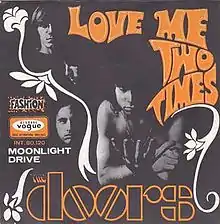Love Me Two Times
"Love Me Two Times" is a song by the American rock band the Doors. It first appeared on their second studio album Strange Days. It was edited to a 2:37 length and released as the second single (after "People Are Strange") from that album, and reached number 25 on the charts in the United States.[1]
| "Love Me Two Times" | ||||
|---|---|---|---|---|
 | ||||
| Single by the Doors | ||||
| from the album Strange Days | ||||
| B-side | "Moonlight Drive" | |||
| Released | November 1967 | |||
| Recorded | May & August 1967 | |||
| Genre | ||||
| Length |
| |||
| Label | Elektra | |||
| Songwriter(s) | The Doors | |||
| Producer(s) | Paul A. Rothchild | |||
| The Doors singles chronology | ||||
| ||||
Ray Manzarek played the final version of this song on a harpsichord, not a clavichord.[2] Manzarek described the instrument as "a most elegant instrument that one does not normally associate with rock and roll."[2]
"Love Me Two Times" was considered to be somewhat risqué for radio airplay, being banned in New Haven for being "too controversial," much to the dismay of the band.[3]
Lyrics
As with the other songs on Strange Days, the album liner notes list the songwriters as the Doors[4] as does the "Love Me Two Times" single; the performance rights organization ASCAP shows the writers as the individual Doors members.[5]
In his autobiography, Manzarek described the song as "Robby [Krieger]'s great blues/rock [sic] classic about lust and loss, or multiple orgasms, I'm not sure which".[2] According to author Rich Weldman the song is about a sailor or soldier spending one last day with his girlfriend before shipping out to war.[6]
Critical reception
In an AllMusic album review of Strange Days, critic Richie Unterberger described "Love Me Two Times" as "jerkily rhythmic".[7] Rolling Stone called the song a "heavy, evocative and climatic piece".[8] Sal Cinquemani of Slant Magazine also proclaimed that "The album’s most accessible, straightforward rock tune is the racy “Love Me Two Times,” which features a virtuosic harpsichord solo and one of the band’s grooviest guitar riffs."[9]
Aerosmith version
"Love Me Two Times" was recorded by Aerosmith for the soundtrack of the 1990 film Air America (whose producers, Carolco Pictures, would also produce a biopic about the Doors). The band also performed it at its 1990 MTV Unplugged performance, where lead singer Steven Tyler dedicated the song to Jim Morrison, who performed with the Doors at the same venue of the Unplugged performance, the Ed Sullivan Theater, several years prior.[10] The 1990 cover reached number 27 on the U.S. Mainstream Rock Tracks chart. In 2001, the song was included on their greatest hits album, Young Lust: The Aerosmith Anthology. In addition, a remixed version was included on the Doors tribute album Stoned Immaculate, with added slide guitar by Robby Krieger and keyboards by Ray Manzarek.[11]
References
- "The Doors Chart History: Hot 100". Billboard.com. 2019. Archived from the original on May 7, 2018. Retrieved August 23, 2019.
- Manzarek, Ray (October 15, 1999). Light My Fire. Penguin. p. 258. ISBN 9780698151017.
- Densmore, John (November 4, 2009). Riders on the Storm: My Life with Jim Morrison and the Doors. Random House Publishing Group. ISBN 9780307429025.
- Strange Days (Album notes). The Doors. New York City: Elektra Records. 1967. Back cover. EKS-74014.CS1 maint: others (link)
- "ACE Repertory: Love Me Two Times (Work ID:420142152)". ASCAP. Retrieved July 25, 2020.
- Weldman, Rich (2011). The Doors FAQ: All That's Left to Know About the Kings of Acid Rock. Rowman & Littlefield. ISBN 978-1617131141.
- Unterberger, Richie. "Strange Days – Review". AllMusic. Retrieved August 30, 2020.
- "The Doors: Strange Days – Review". Rolling Stone. November 23, 1967. Retrieved August 30, 2020.
- Cinquemani, Sal (April 18, 2007). "Review: The Doors, Strange Days". Slant Magazine. Retrieved August 30, 2020.
- "Aerosmith on MTV Unplugged". Rock This Way. Retrieved October 21, 2012.
- Stoned Immaculate: The Music of the Doors (Media notes). 2000.